| Srl | Item |
| 1 |
ID:
117110
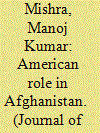

|
|
|
| 2 |
ID:
139376
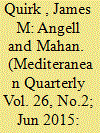

|
|
|
|
|
| Summary/Abstract |
Norman Angell and Alfred Thayer Mahan were two of the leading thinkers on pre–World War I “interdependence,” offering competing lessons on the changes in technology, economics, and security. At different times during the twentieth century, each one’s ideas seemed to best explain global politics and strategy. This essay reconsiders their ideas in the current era of globalization and global threats.
|
|
|
|
|
|
|
|
|
|
|
|
|
|
|
|
| 3 |
ID:
134926
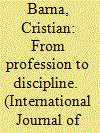

|
|
|
|
|
| Summary/Abstract |
One factor that has led to profound changes in the evolution of intelligence is the removal of many physical and ideological barriers that previously prevented communication and interaction, as existed in the Cold War era. In this ideological post-war period, in which most societies are no longer militarily threatened but rather politically, economically, culturally, and perhaps religiously, undermined, intelligence services are facing new challenges, being called upon to contribute to the reduction or removal of a series of threats and negative effects.
|
|
|
|
|
|
|
|
|
|
|
|
|
|
|
|
| 4 |
ID:
119037
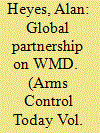

|
|
|
| 5 |
ID:
065230
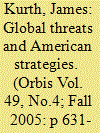

|
|
|
| 6 |
ID:
184027
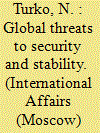

|
|
|
|
|
| Summary/Abstract |
International Security, Strategic Stability, and Information Technologies [in Russian]* is a monograph on the most pressing problems of our time associated with threats posed by the harmful use of information and communication technologies (ICT). These issues are critically important for strengthening global security and protecting Russia's national interests in the international arena.
|
|
|
|
|
|
|
|
|
|
|
|
|
|
|
|
| 7 |
ID:
152822
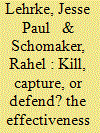

|
|
|
|
|
| Summary/Abstract |
This article examines the effectiveness of contemporary counterterrorism strategy in the global fight against terrorism from 2001 to 2011. We seek to maximize the comparative approach more than most existing studies by examining three tactics (killing, capturing, and defending) applied at three scopes (leader, operational, and broad) on three levels (global, movement [jihadi], and organizational [al-Qaeda and Taliban]), while also measuring effectiveness along several quantitative, qualitative, and spatial dimensions. Drawing from resource theory (and its derived analytical approaches) and empirical terrorism studies, we formulate competing hypotheses that are quantitatively tested using a dataset with several original aspects. We find that both killing and capturing can have large effects but these effects vary based on both states' and terrorists' targeting strategies. The most interesting specific findings are that drone strikes seem counterproductive for counterterrorism while renditions seem effective. However, these effects were dwarfed by those of increased defenses, which reduce attacks in the West while redirecting them to other areas in the world. While we find the theory mostly sound, though in need of refocus, we believe current policy trends foretell an increase in terrorist activity in the coming years.
|
|
|
|
|
|
|
|
|
|
|
|
|
|
|
|
| 8 |
ID:
163097
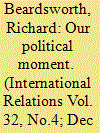

|
|
|
|
|
| Summary/Abstract |
National interest and national security need to be reconfigured so as to accommodate a state’s response to global threats and challenges. This requires in turn addressing the following paradox: the pooling and ceding of sovereignty must be made in the very name of national sovereignty. The article maintains that it is one of the foremost challenges of political responsibility and political leadership today to assume this paradox and thereby align national and global interests and practices. The alignment can, it is suggested, effectively oppose sovereigntism and nationalism, on one hand, and abstract global governance, on the other. To promote this alignment, the article advances a renewed understanding of state responsibility to citizenship under conditions of globalization.
|
|
|
|
|
|
|
|
|
|
|
|
|
|
|
|
| 9 |
ID:
131490
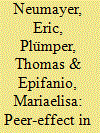

|
|
|
|
|
| Publication |
2014.
|
| Summary/Abstract |
Existing accounts posit that defensively oriented counterterrorist policies create negative externalities and result in regulatory competition that induces governments to increasingly tighten their policies. We argue that rather than causing an unconditional global "race to the top," spatial dependence in counterterrorist policies is limited to within groups of countries exposed to a similar level of threat from international terrorism. Countries strongly differ in their propensity to become the target of an international terror attack. Governments can safely ignore counterterrorist policies enacted by countries outside their "peer group," but they must pay attention to measures undertaken by their peers. We test several predictions derived from our theory in an empirical analysis of counterterrorist regulations in twenty Western developed-country democracies over the period 2001 to 2008.
|
|
|
|
|
|
|
|
|
|
|
|
|
|
|
|
| 10 |
ID:
096439
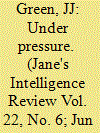

|
|
|